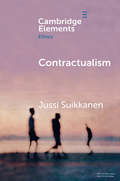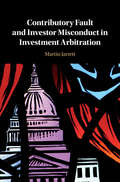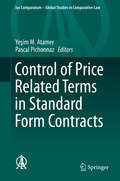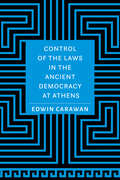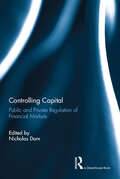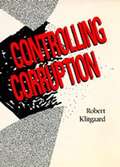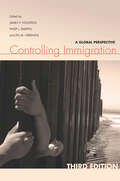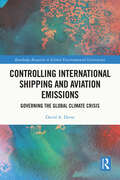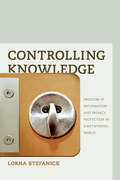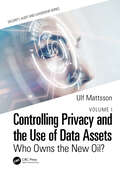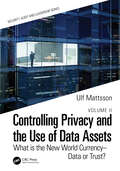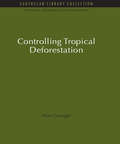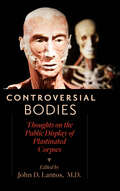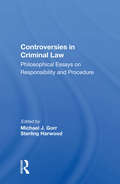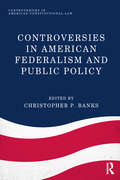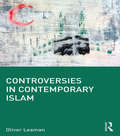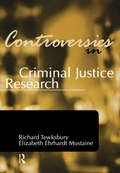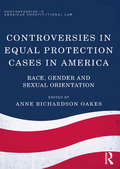- Table View
- List View
Contractualism (Elements in Ethics)
by Jussi SuikkanenThis Element begins by describing T.M. Scanlon's contractualism according to which an action is right when it is authorised by the moral principles no one could reasonably reject. This view has argued to have implausible consequences with regards to how different-sized groups, non-human animals, and cognitively limited human beings should be treated. It has also been accused of being theoretically redundant and unable to vindicate the so-called deontic distinctions. I then distinguish between the general contractualist framework and Scanlon's version of contractualism. I explain how the general framework enables us to formulate many other versions of contractualism some of which can already be found in the literature. Understanding contractualism in this new way enables us both to understand the structural similarities and differences between different versions of contractualism and also to see the different objections to contractualism as internal debates about which version of contractualism is correct.
Contributions to Law, Philosophy and Ecology: Exploring Re-Embodiments (Law, Justice and Ecology)
by Ruth Thomas-Pellicer Vito De Lucia Sian SullivanContributions to Law, Philosophy and Ecology: Exploring Re-Embodiments is a preliminary contribution to the establishment of re-embodiments as a theoretical strand within legal and ecological theory, and philosophy. Re-embodiments are all those contemporary practices and processes that exceed the epistemic horizon of modernity. As such, they offer a plurality of alternative modes of theory and practice that seek to counteract the ecocidal tendencies of the Anthropocene. The collection comprises eleven contributions approaching re-embodiments from a multiplicity of fields, including legal theory, eco-philosophy, eco-feminism and anthropology. The contributions are organized into three parts: ‘Beyond Modernity’, ‘The Sacred Dimension’ and ‘The Legal Dimension’. The collection is opened by a comprehensive introduction that situates re-embodiments in theoretical context. Whilst closely bound with embodiment and new materialist theory, this book contributes a unique voice that echoes diverse political processes contemporaneous to our times. Written in an elegant and accessible language, the book will appeal to undergraduates, postgraduates and established scholars alike seeking to understand and take re-embodiments further, both politically and theoretically.
Contributory Fault and Investor Misconduct in Investment Arbitration
by Martin JarrettInvestors must be held to account for their flawed contributions or otherwise wrongful conduct, but exactly what 'holding to account' means remains an enigma. Opinions vary on whether such circumstances are relevant to admissibility, jurisdiction, liability, or remedies. Reasoning from certain proposed axioms, this book suggests that such circumstances are only relevant to liability, meaning that the legal concepts that they activate, contributory fault and illegality, are defences. Three defences are identified: mismanagement, investment reprisal, and post-establishment illegality. While they might lack formal recognition, arbitral tribunals have implicitly applied them in multiple investment arbitrations. In detailing their legal content, special attention is paid to resolving the problems that they raise relating to causation, apportionment of liability, distinguishing these defences from their conceptual cousins, and arbitral tribunals' jurisdiction over pleas based on investor misconduct. The result is a restatement of the rules on contributory fault and investor misconduct applicable in investment arbitrations.
Control of Price Related Terms in Standard Form Contracts (Ius Comparatum - Global Studies in Comparative Law #36)
by Yeşim M. Atamer Pascal PichonnazThis book explores various approaches around the world regarding price term control, and particularly discusses the effectiveness of two major paths: ex ante regulatory and ex post judicial intervention. Price control and its limits are issues that affect all liberal market economies, as well as more regulated markets. For the past several years, courts in many different countries have been confronted with the issue of whether, and to what extent, they should intervene regarding price-related terms in standard form contracts – especially in the area of consumer contracts. Open price clauses, flat remunerations, price adjustment clauses, clauses giving the seller/supplier the right to ask for additional payments, bundling or partitioning practices, etc.: a variety of price related terms are used to manipulate customers’ choices, often also by exploiting their behavioral biases. The result is an unfavorable contract that is later challenged in court. However, invalidating a given price term in standard forms e.g. of a banking or utilities contract only has an inter partes effect, which means that in thousands if not millions of similar contracts, the same clauses continue to be used. Effective procedural rules are often lacking. Therefore, pricing patterns that serve to hide rather than to reveal the real cost of goods and services require special attention on the part of regulators. The aim of this book is to determine the various approaches in the world regarding price term control, and particularly to discuss the efficiency of both paths, ex ante regulatory and ex post judicial intervention. Thanks to its broad comparative analysis, this book offers a thorough overview of the methods employed in several countries. It gathers twenty-eight contributions from national rapporteurs and one supra-national rapporteur (EU) to the 2018 IACL Congress held in Fukuoka. These are supplemented by a general report presented at the same IACL Congress, which includes a comparative analysis of the national and supranational reports. The national contributors hail from around the globe, including Africa (1), Asia (5), Europe (17), the European Union (1) and the Americas (5).
Control of the Laws in the Ancient Democracy at Athens (Cultural Histories of the Ancient World)
by Edwin CarawanThe power of the court to overturn a law or decree—called judicial review—is a critical feature of modern democracies. Contemporary American judges, for example, determine what is consistent with the Constitution, though this practice is often criticized for giving unelected officials the power to strike down laws enacted by the people's representatives. This principle was actually developed more than two thousand years ago in the ancient democracy at Athens. In Control of the Laws in the Ancient Democracy at Athens, Edwin Carawan reassesses the accumulated evidence to construct a new model of how Athenians made law in the time of Plato and Aristotle, while examining how the courts controlled that process. Athenian juries, Carawan explains, were manned by many hundreds of ordinary citizens rather than a judicial elite. Nonetheless, in the 1890s, American apologists found vindication for judicial review in the ancient precedent. They believed that Athenian judges decided the fate of laws and decrees legalistically, focusing on fundamental text, because the speeches that survive from antiquity often involve close scrutiny of statutes attributed to lawgivers such as Solon, much as a modern appellate judge might resort to the wording of the Framers. Carawan argues that inscriptions, speeches, and fragments of lost histories make clear that text-based constitutionalism was not so compelling as the ethos of the community. Carawan explores how the judicial review process changed over time. From the restoration of democracy down to its last decades, the Athenians made significant reforms in their method of legislation, first to expedite a cumbersome process, then to revive the more rigorous safeguards. Jury selection adapted accordingly: the procedure was recast to better represent the polis, and packing the court was thwarted by a complicated lottery. But even as the system evolved, the debate remained much the same: laws and decrees were measured by a standard crafted in the image of the people. Offering a comprehensive account of the ancient origins of an important political institution through philological methods, rhetorical analysis of ancient arguments, and comparisons between models of judicial review in ancient Greece and the modern United States, Control of the Laws in the Ancient Democracy at Athens is an innovative study of ancient Greek law and democracy.
Control: The Dark History And Troubling Present Of Eugenics
by Adam RutherfordHow did an obscure academic idea pave the way to the Holocaust within just fifty years? Control is a book about eugenics, what geneticist Adam Rutherford calls “a defining idea of the twentieth century.” Inspired by Darwin’s ideas about evolution, eugenics arose in Victorian England as a theory for improving the British population, and quickly spread to America, where it was embraced by presidents, funded by Gilded Age monopolists, and enshrined into racist American laws that became the ideological cornerstone of the Third Reich. Despite this horrific legacy, eugenics looms large today as the advances in genetics in the last thirty years—from the sequencing of the human genome to modern gene editing techniques—have brought the idea of population purification back into the mainstream. Eugenics has “a short history, but a long past,” Rutherford writes. The first half of Control is the history of an idea, from its roots in key philosophical texts of the classical world all the way into their genocidal enactment in the twentieth century. The second part of the book explores how eugenics operates today, as part of our language and culture, as part of current political and racial discussions, and as an eternal temptation to powerful people who wish to improve society through reproductive control. With disarming wit and scientific precision, Rutherford explains why eugenics still figures prominently in the twenty-first century, despite its genocidal past. And he confronts insidious recurring questions—did eugenics work in Nazi Germany? And could it work today?—revealing the intellectual bankruptcy of the idea, and the scientific impossibility of its realization.
Controligarchs: Exposing the Billionaire Class, their Secret Deals, and the Globalist Plot to Dominate Your Life
by Seamus Bruner"Controligarchs peers into the future and provides a haunting and revelatory exposé of the globalist elite&’s playbook for the next five years.&”- Peter Schweizer, author of Red-Handed, Clinton Cash, and Profiles in CorruptionImagine a world in which you own nothing and rent everything. Most of the protein in your diet comes from bugs. You are not allowed to have more than one child, and your financial and medical data are instantly transferred to a centralized government database via a subdermal microchip.Controligarchs warns that this will be our existence if the supranational elites of the World Economic Forum get their way.In this book, investigative journalist Seamus Bruner—who led the teams whose findings sparked multiple FBI investigations and congressional probes into the Clintons and the Bidens—exposes the billionaires who control the levers of power that dominate every aspect of your life. Inside this pathbreaking new book, you will discover: Bill Gates&’s $11.7 billion food takeover scheme… and the real reason he&’s snapping up America&’s farmland Mark Zuckerberg&’s $36 billion plot to reengineer society and force you into tech addiction Jeff Bezos&’s taxpayer-funded electric vehicle ambitions, climate hypocrisy, and $1.2 billion plan to spy on you by overseeing your &“smart&” home The Soros family&’s project to use its $25 billion empire to influence elections and society for the next 50 years How World Economic Forum (WEF) founder Klaus Schwab built an exclusive club in Davos where the top 25 WEF members—now worth more than $10 trillion—have more economic power than most world governments, and how these global oligarchs are seizing control over our future Based on a mountain of financial filings, insider documents, and corporate records, Controligarchs rips back the curtain on never-before-published revelations about the life-altering schemes that globalist elites have in store for you. This book is a must-read for anyone who values American independence and personal freedom.
Controlling Administrative Power
by Peter CaneThis wide-ranging comparative account of the legal regimes for controlling administrative power in England, the USA and Australia argues that differences and similarities between control regimes may be partly explained by the constitutional structures of the systems of government in which they are embedded. It applies social-scientific and historical methods to the comparative study of law and legal systems in a novel and innovative way, and combines accounts of long-term and large-scale patterns of power distribution with detailed analysis of features of administrative law and the administrative justice systems of three jurisdictions. It also proposes a new method of analysing systems of government based on two different models of the distribution of public power (diffusion and concentration), a model which proves more illuminating than traditional separation-of-powers analysis.
Controlling Capital: Public and Private Regulation of Financial Markets
by Nicholas DornControlling Capital examines three pressing issues in financial market regulation: the contested status of public regulation, the emergence of ‘culture’ as a proposed modality of market governance, and the renewed ascendancy of private regulation. In the years immediately following the outbreak of crisis in financial markets, public regulation seemed almost to be attaining a position of command – the robustness and durability of which is explored here in respect of market conduct, European Union capital markets union, and US and EU competition policies. Subsequently there has been a softening of command and a return to public-private co-regulation, positioned within a narrative on culture. The potential and limits of culture as a regulatory resource are unpacked here in respect of occupational and organisational aspects, stakeholder connivance and wider political embeddedness. Lastly the book looks from both appreciative and critical perspectives at private regulation, through financial market associations, arbitration of disputes and, most controversially, market ‘policing’ by hedge funds. Bringing together a distinguished group of international experts, this book will be a key text for all those concerned with issues arising at the intersection of financial markets, law, culture and governance.
Controlling Corruption
by Robert KlitgaardCorruption is increasingly recognized as a preeminent problem in the developing world. Bribery, extortion, fraud, kickbacks, and collusion have resulted in retarded economies, predator elites, and political instability. In this lively and absorbing book, Robert Klitgaard provides a framework for designing anti-corruption policies, and describes through five case studies how courageous policymakers were able to control corruption.
Controlling Immigration: A Global Perspective, Third Edition
by Philip L. Martin James F. Hollifield Pia M. OrreniusThe third edition of this major work provides a systematic, comparative assessment of the efforts of a selection of major countries, including the U.S., to deal with immigration and immigrant issues— paying particular attention to the ever-widening gap between their migration policy goals and outcomes. Retaining its comprehensive coverage of nations built by immigrants and those with a more recent history of immigration, the new edition pays particular attention to the tensions created by post-colonial immigration, and explores how countries have attempted to control the entry and employment of legal and illegal Third World immigrants, how they cope with the social and economic integration of these new waves of immigrants, and how they deal with forced migration.
Controlling International Shipping and Aviation Emissions: Governing the Global Climate Crisis (Routledge Research in Global Environmental Governance)
by David A. DeeseThis book assesses the extent to which two specialized UN agencies- the International Maritime Organization (IMO) in London and the International Civil Aviation Organization (ICAO) in Montreal - have been able to regulate environmental pollution in the global commons. Since the Kyoto Protocol and its tasking of these two International Organisations (IOs) in 1997 to regulate greenhouse gas emissions from the fast-growing international shipping and aviation sectors, they have struggled with the assignment even as the external pressure has mounted for them to act. David Deese examines why these two UN agencies have largely failed to execute their critical missions to date and explores the most promising emerging and feasible routes to control and reduce these emissions by other means. Drawing on a range of sources including interviews with key actors in the IMO and ICAO, as well as from industry and national governments, Deese looks at the multifaceted politics that drive these IOs and considers how this has delayed and frustrated the execution of their assigned climate mitigation missions. He also explains how the limitations of the IMO and ICAO are likely to be found to a degree in other UN specialized agencies and examines how lessons learned here will be helpful in understanding the operations of other IOs. The book will be of great interest to students and scholars of global governance and international organisations, transport and environment and climate change. It will also be a useful resource for industry and non-profit experts and public officials working in shipping and aviation regulation.
Controlling Knowledge: Freedom of Information and Privacy Protection in a Networked World
by Lorna StefanickDigital communications technology has immeasurably enhanced our capacity to store, retrieve, and exchange information. But who controls our access to information, and who decides what others have a right to know about us? In Controlling Knowledge, author Lorna Stefanick offers a thought-provoking and user-friendly overview of the regulatory regime that currently governs freedom of information and the protection of privacy.Aiming to clarify rather than mystify, Stefanick outlines the history and application of FOIP legislation, with special focus on how these laws affect the individual. To illustrate the impact of FOIP, she examines the notion of informed consent, looks at concerns about surveillance in the digital age, and explores the sometimes insidious influence of Facebook. Specialists in public policy and public administration, information technology, communications, law, criminal justice, sociology, and health care will find much here that bears directly on their work, while students and general readers will welcome the book's down-to-earth language and accessible style.Intended to serve as a "citizen's guide," Controlling Knowledge is a vital resource for anyone seeking to understand how freedom of information and privacy protection are legally defined and how this legislation is shaping our individual rights as citizens of the information age. + Close
Controlling Privacy and the Use of Data Assets - Volume 1: Who Owns the New Oil? (Security, Audit and Leadership Series)
by Ulf Mattsson"Ulf Mattsson leverages his decades of experience as a CTO and security expert to show how companies can achieve data compliance without sacrificing operability." Jim Ambrosini, CISSP, CRISC, Cybersecurity Consultant and Virtual CISO "Ulf Mattsson lays out not just the rationale for accountable data governance, he provides clear strategies and tactics that every business leader should know and put into practice. As individuals, citizens and employees, we should all take heart that following his sound thinking can provide us all with a better future." Richard Purcell, CEO Corporate Privacy Group and former Microsoft Chief Privacy Officer Many security experts excel at working with traditional technologies but fall apart in utilizing newer data privacy techniques to balance compliance requirements and the business utility of data. This book will help readers grow out of a siloed mentality and into an enterprise risk management approach to regulatory compliance and technical roles, including technical data privacy and security issues. The book uses practical lessons learned in applying real-life concepts and tools to help security leaders and their teams craft and implement strategies. These projects deal with a variety of use cases and data types. A common goal is to find the right balance between compliance, privacy requirements, and the business utility of data. This book reviews how new and old privacy-preserving techniques can provide practical protection for data in transit, use, and rest. It positions techniques like pseudonymization, anonymization, tokenization, homomorphic encryption, dynamic masking, and more. Topics include Trends and Evolution Best Practices, Roadmap, and Vision Zero Trust Architecture Applications, Privacy by Design, and APIs Machine Learning and Analytics Secure Multiparty Computing Blockchain and Data Lineage Hybrid Cloud, CASB, and SASE HSM, TPM, and Trusted Execution Environments Internet of Things Quantum Computing And much more!
Controlling Privacy and the Use of Data Assets - Volume 2: What is the New World Currency – Data or Trust? (Security, Audit and Leadership Series)
by Ulf MattssonThe book will review how new and old privacy-preserving techniques can provide practical protection for data in transit, use, and rest. We will position techniques like Data Integrity and Ledger and will provide practical lessons in Data Integrity, Trust, and data’s business utility. Based on a good understanding of new and old technologies, emerging trends, and a broad experience from many projects in this domain, this book will provide a unique context about the WHY (requirements and drivers), WHAT (what to do), and HOW (how to implement), as well as reviewing the current state and major forces representing challenges or driving change, what you should be trying to achieve and how you can do it, including discussions of different options. We will also discuss WHERE (in systems) and WHEN (roadmap). Unlike other general or academic texts, this book is being written to offer practical general advice, outline actionable strategies, and include templates for immediate use. It contains diagrams needed to describe the topics and Use Cases and presents current real-world issues and technological mitigation strategies. The inclusion of the risks to both owners and custodians provides a strong case for why people should care. This book reflects the perspective of a Chief Technology Officer (CTO) and Chief Security Strategist (CSS). The Author has worked in and with startups and some of the largest organizations in the world, and this book is intended for board members, senior decision-makers, and global government policy officials—CISOs, CSOs, CPOs, CTOs, auditors, consultants, investors, and other people interested in data privacy and security. The Author also embeds a business perspective, answering the question of why this an important topic for the board, audit committee, and senior management regarding achieving business objectives, strategies, and goals and applying the risk appetite and tolerance. The focus is on Technical Visionary Leaders, including CTO, Chief Data Officer, Chief Privacy Officer, EVP/SVP/VP of Technology, Analytics, Data Architect, Chief Information Officer, EVP/SVP/VP of I.T., Chief Information Security Officer (CISO), Chief Risk Officer, Chief Compliance Officer, Chief Security Officer (CSO), EVP/SVP/VP of Security, Risk Compliance, and Governance. It can also be interesting reading for privacy regulators, especially those in developed nations with specialist privacy oversight agencies (government departments) across their jurisdictions (e.g., federal and state levels).
Controlling Tropical Deforestation: Controlling Tropical Deforestation (Natural Resource Management Set)
by Alan GraingerTropical rain forest is being cleared so rapidly and on such a scale that it is a major global environmental problem, threatening the survival of half of the world's plant and animal species and contributing to global climate change through the greenhouse effect. But, despite widespread concern for over twenty years, only limited progress has been made in controlling deforestation and improving forest management in the humid tropics. In this book Alan Grainger offers afresh analysis of the causes of deforestation and presents an integrated strategy for controlling it. His strategy embraces agriculture, forestry and conservation and stresses the need for changes in government policies if land use is to be made more sustainable and the underlying causes of the problem are to be addressed. Controlling Tropical Deforestation is essential reading for policy makers, agronomists, foresters, conservationists and development professionals. To general readers and students on introductory courses at schools and universities it also offers the first concise but comprehensive overview of the causes, scale and consequences of deforestation. Alan Grainger is a lecturer in geography at the University of Leeds. He is author of The Threatening Desert: Controlling Desertification, also published by Earthscan. Originally published in 1992
Controlling Urban Events: Law, Ethics and the Material
by Andrea PavoniHow does order emerge out of the multiplicity of bodies, objects, ideas and practices that constitute the urban? This book explores the relation between space, law and control in the contemporary city – and particularly in the context of urban ‘mega events’ – through a combined geographical and normative analysis. Informed by the recent spatial, affective and material ‘turns’ in the humanities and social sciences, Andrea Pavoni addresses this question by pursuing an innovative and trans-disciplinary approach, capable of accounting for the emergence of order in urban space both at the conceptual and empirical levels. Two overarching objectives are pursued. First, to account for the increasing convergence of logics, techniques and technologies of law, security and marketing into novel, potentially oppressive spatial configurations. Second, to envisage a consistent ethico-political strategy to counter this evolution, by rethinking originally and in radically spatial terms the notion of justice. Forging a sophisticated and original analysis, this book offers an analysis that will be of considerable interest to those working in critical urban geography, critical legal studies, critical event studies, surveillance and control studies.
Controlling digitaler Behördenkommunikation: Wie öffentliche Institutionen ihre digitale Kommunikation steuern und ihre Kommunikationsleistung messen können
by Bernhard Hirsch Birgit GrainDas Buch zeigt, wie Behörden ihre digitalen Kommunikationsprozesse mit Unterstützung eines umfassenden Kommunikationscontrollings steuern und die Kommunikationsleistung messen können. Digitale Behördenkommunikation gilt als zukunftsweisendes Thema, weil sie große Potenziale für die Bürgerzufriedenheit und die Effektivität und Effizienz von Verwaltungsprozessen birgt. Theoretisch fundiert und mit Praxisbeispielen erläutern die Autoren die Grundlagen des Kommunikationscontrollings, die Zielsetzung digitaler Kommunikationsmaßnahmen öffentlicher Institutionen sowie die besonderen Herausforderungen bei der Leistungsmessung digitaler Kommunikationsprozesse. Sie zeigen Lösungsansätze auf, wie Behörden belastbare Leistungskennzahlen für das Controlling ihrer digitalen Kommunikationsmaßnahmen ableiten können. Zudem geben sie Handlungsempfehlungen, um die digitale Transformation voranzutreiben und eine effektive Messung und Steuerung der Kommunikationsleistung weiter zu optimieren – ergänzt um praxisnahe Tipps, wie die Einführung eines Kommunikationscontrollings in Behörden gelingt. Langjährig erfahrene Kommunikationsprofis aus Bundes- und Landesbehörden bereichern dieses Werk zudem mit ihren Erfahrungen aus dem Kommunikationsalltag.
Controlling – Aktuelle Entwicklungen und Herausforderungen: Digitalisierung, Nachhaltigkeit und Spezialaspekte
by Stefan Mayr Birgit Feldbauer-DurstmüllerDie in diesem Band vorgelegten Beiträge verorten das Controlling im Spannungsfeld von Digitalisierung und Nachhaltigkeit aus konzeptioneller und empirischer Perspektive: In Anbetracht aktueller weitreichender Veränderungen sieht sich das Controlling mit einer Vielzahl von Anwendungsfeldern konfrontiert, die nicht nur die Controller-Rolle maßgeblich verändern, sondern auch Familienunternehmen und Klein- und Mittelunternehmen vor besondere Herausforderungen stellen. Dieser vielschichtigen Problemlage wird der Band mit einem klaren Wissenschafts- und Praxisbezug gerecht: Empirische Befunde qualitativer und quantitativer Art werden theoretisch fundiert dargelegt sowie durch praktische Beispiele, Fallstudien und Praxisempfehlungen ergänzt.
Controversial Bodies: Thoughts on the Public Display of Plastinated Corpses
by John D. LantosControversial, fascinating, disturbing, and often beautiful, plastinated human bodies—such as those found at Body Worlds exhibitions throughout the world—have gripped the public's imagination. These displays have been lauded as educational, sparked protests, and drawn millions of visitors. This book looks at the powerful sway these corpses hold over their living audiences everywhere.Plastination was invented in the 1970s by German anatomist Gunther von Hagens. The process transforms living tissues into moldable plastic that can then be hardened into a permanent shape. Von Hagens first exhibited his expertly dissected, artfully posed plastinated bodies in Japan in 1995. Since then, his shows have continuously attracted so many paying customers that they have inspired imitators, brought accusations of unethical or even illegal behavior, and ignited vigorous debates among scientists, educators, religious leaders, and law enforcement officials. These lively, thought-provoking, and sometimes personal essays reflect on such public displays from ethical, legal, cultural, religious, pedagogical, and aesthetic perspectives. They examine what lies behind the exhibitions' popularity and explore the ramifications of turning corpses into a spectacle of amusement. Contributions from bioethicists, historians, physicians, anatomists, theologians, and novelists dig deeply into issues that compel, upset, and unsettle us all.
Controversies In Criminal Law: Philosophical Essays On Responsibility And Procedure
by Michael J. Gorr Sterling HarwoodWhen philosophers have turned their attention to criminal law, they have tended to emphasize problems about the criminalization of acts and the justification for the punishment of those who commit such acts. But there has been a recent wave of significant and exciting philosophical work on issues surrounding two other topics in criminal law: Given the performance of a criminal act, what establishes criminal? And what should the state be allowed to use in trying to establish liability? In this carefully edited volume, Michael J. Gorr and Sterling Harwood present a generous selection of papers representing the best of this new work. Avoiding overly abstract pieces in favor of essays that highlight both the philosophical questions and what actually happens on the street and in the courtroom, they have produced a book that is accessible and relevant to the concerns of students. Controversies in Criminal law is an innovative and useful contribution to the teaching of philosophy of law and the foundations of criminal justice. It will be widely used in philosophy departments, law schools, and schools of criminal justice.
Controversies in American Federalism and Public Policy (Controversies in American Constitutional Law)
by Christopher P. BanksThis interdisciplinary collection presents a scholarly treatment of how the constitutional politics of federalism affect governments and citizens, offering an accessible yet comprehensive analysis of the U.S. Supreme Court’s federalism jurisprudence and its effect on the development of national and state policies in key areas of constitutional jurisprudence. The contributors address the impact that Supreme Court federalism precedents have in setting the parameters of national law and policies that the states are often bound to respect under constitutional law, including those that relate to the scope and application of gun rights, LGBT freedoms, health care administration, anti-terrorism initiatives, capital punishment, immigration and environmental regulation, the legalization of marijuana and voting rights. Uniting scholarship in law, political science, criminology, and public administration, the chapters study the themes, principles, and politics that traditionally have been at the center of federalism research across different academic disciplines. They look at the origins, nature and effect of dual and cooperative federalism, presidential powers and administrative regulation, state sovereignty and states’ rights, judicial federalism and the advocacy of organized interests.
Controversies in Contemporary Islam
by Oliver LeamanThis book helps to deepen our understanding of the varieties of contemporary Islam and the issues that are of most concern to Muslims today. Oliver Leaman explores some of the controversies and debates that exist within Islam and between Islam and other religions. He considers how the religion can be defined by looking at the contrast between competing sets of beliefs, and arguments amongst Muslims themselves over the nature of the faith. Areas covered include: Qur’anic interpretation, gender, finance, education, and nationalism. Examples are taken from a range of contexts and illustrate the diversity of approaches to Islam that exists today.
Controversies in Criminal Justice Research (Controversies In Crime And Justice Ser.)
by Richard Tewksbury Elizabeth Ehrhardt MustaineThis book of original essays presents students with challenging looks at some of the most basic, and sometimes most difficult, decisions faced by criminal justice researchers. Each chapter presents an overview of a foundational question/issue in the conduct of research, and discussions of the options to resolve these controversies.
Controversies in Equal Protection Cases in America: Race, Gender and Sexual Orientation (Controversies in American Constitutional Law)
by Anne Richardson OakesThis collection engages with current issues on equal protection in the USA, as seen from the perspectives of leading academics in this area. Contributors with a range of perspectives interrogate the legal, theoretical and factual assumptions which shape case law and consider the extent to which they satisfactorily address contemporary concerns with social hierarchies and norms. Divided into five parts, the study focusses on the connections between equal protection jurisprudence, discrimination in its contemporary manifestations, the implications of identity politics and the moral and political conceptualizations of equality that represent the parameters of debate. Drawing on historical analysis and disciplinary insights of the social sciences, the book bridges the gap between theory and practice. The themes presented and analyses developed are among some of the most contentious currently in America, and will be of interest not just to lawyers and legal academics, but also to inter-disciplinary social science researchers, including sociologists, economists and political scientists.
